Some GINKs (that is Green Inclined, No Kids) will tell you that going child-free helps reduce impact on our environment. They’ve tallied up the material needs, food and water that their prospective child might consume over his/her lifetime and decided our planet with 7.2 billion people at last count just can’t handle it.
Going child-free is a great strategy for those who have no interest in child-rearing. But for many people, the decision to raise a child isn’t one that necessarily comes from a critical look at the facts. It’s an emotional choice to make a life “complete.”
As a long-time environmentalist and sustainability advocate, I understand all the reasons to go child-free, but my emotional drive won out. Here’s my story.
From Birth, My Daughter Had Strong Opinions About Her Right To Consume And Produce Waste
Yes, my daughter will create garbage over her lifetime and she will use water and energy and other precious resources. But so do the rest of us humans (with the exception of No Impact Man). And yes, our family’s waste stream has nearly doubled because of her diapers, and we’re doing a lot of extra laundry. But I assure all of the GINKs out there that these things are only temporary.
But We Don’t Have To Be A GINK Or Live Child-Free To Live A No-Waste Lifestyle
Despite the many ways they add to the global waste stream, there are myriad ways parents can minimize their baby’s impacts through reuse. My husband and I are looking for used options and intend to pass along toys and clothing when we are done with them. And instead of disposables, we’ll explore compostable diapers as soon as we get used to the new routine.
The Decision to Bring a Child Into This World Has Increased My Capacity For Love, Patience And Compassion
These traits make me more effective at my work advocating for sustainability and corporate attention to the triple bottom line. Motherhood has strengthened my desire to fight the good fight so that the bounty of this world is still available for my daughter and future generations.
And as a waste hater in training, she will learn that she has a responsibility to the greater good beyond her own well-being; she will live lightly and help those around her to do the same.
Posting Guidelines
This and other stories published on WeHateToWaste.com are intended to prompt productive conversation about practical solutions for preventing waste. Opinions expressed are solely those of the contributors and WeHateToWaste implies no endorsement of the products or companies mentioned. All comments will be moderated and those that are overly promotional, mean-spirited or off-topic may be deleted. All postings become the property of WeHateToWaste.com.

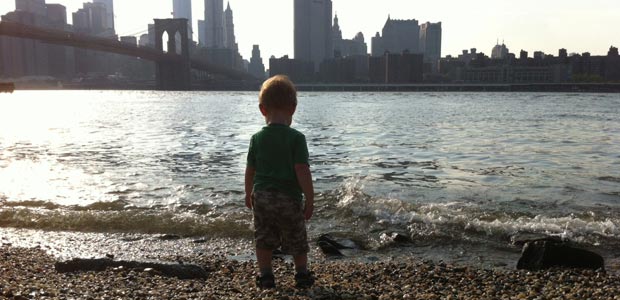
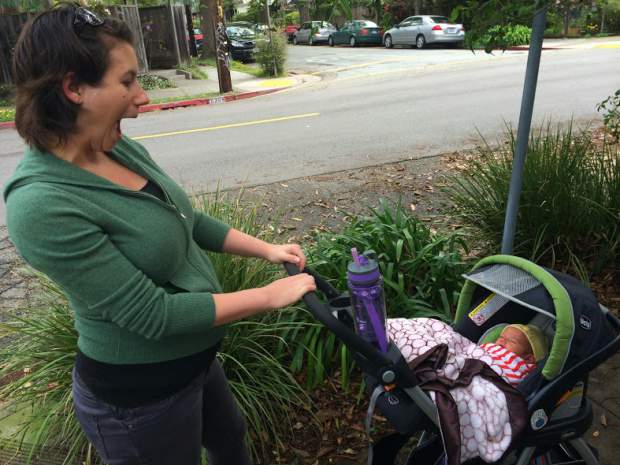
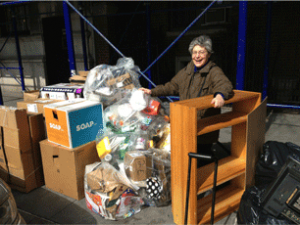
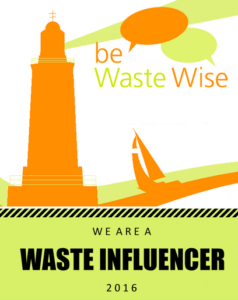
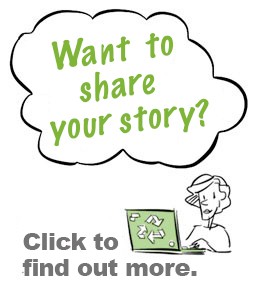
Hi,
I guess I am a GINK but my reasons are slightly different. I feel we haven’t left much of a functioning world for our next generation. Every time I hear of a killing, another environmental ‘accident’, another depressing story on the news, I instinctively think to myself I don’t want to bring a child up in this world or have them deal with all this horror going on around us. Then sometimes I visit my innocent nieces and they restore my faith in humanity and make me want to have such cheerful little versions of God around me.
Hi Anonymous –
I agree that there’s a lot that’s screwed up about our world, but there’s also a lot to be proud of, especially when you look at social issues. Think of how far gay rights have come, even in the last twenty years. Think of all the opportunities that are available to women that weren’t even 50 years ago. Environmental issues are the next big challenge, and we don’t have any choice but to take it on… even if we end up failing!
Just call me Optimist Jen
I was so incredibly moved by your post. It hit really close to home for me because I used to be one of “those” people – I was convinced that I would be adding to the planetary burden if I had a kid. I didn’t even know that there was a term for it – GINK!? It sounds terrible. Since I ‘gave in’ to motherhood, my outlook on life has been totally altered as well. I am doing everything I can to expose my son to nature and living lightly, so that as he grows up, he’s inspired to care for our planet as much as I do. I know for sure that he’s a waste hater in training. He is already picking up litter on the playground and throwing it away and he’s not even 2 yet. Now that I’ve seen the light, it’s hard for me to shake the bleak GINK pledge that I subscribed to unknowingly. It really is possible to keep waste to a minimum even though there is another mouth to feed. We’re doing it! Thank you so much for this heartfelt piece.
A fascinating insight, Jen. I’m not sure I agree with anyone who thinks that going completely child-free is the way to combat overpopulation and resource allocation in the future. Instead, the focus for this should be on the empowerment and education of women in developing nations; that is where the true problem lies. Birth rates in OECD are relatively low compared to the rest of the world.
But, back to the topic of waste-free child rearing.Let’s not discourage people from reproducing for waste reduction motivations, in fact, having babies can be seen as a new motivation for people to be more waste conscious. And it is exactly the types of people who wouldn’t have a child for environmental inclinations that we would want to be reproducing to raise eco-conscious children!
I agree completely. We should also be focusing (IMHO) on better access to birth control and reproductive education so that the children that are born are the ones that are truly wanted.
I loved this post as it resonates so closely with me. I am a proud mother of three waste conscious bundles of joy! My career is focused on making businesses more sustainable and the life I chose helps lead this charge. My children are a huge motivator. Those who share a passion for a sustainable future, and who love children, should leverage the opportunity to teach future generations how to live and work in a sustainable way. Children are not a burden to society or the Earth – adults who were not taught as children to respect the environment and others are the real burden.
Roxanne,
Reading this comment reaffirms my reasons for founding WeHateToWaste.com and makes it worth every moment I spend on it. What an optimistic thought: we can ‘save the planet’ by starting today to teach the children we bring into our world to respect our environment. An earth-shaking concept if ever there was one!
Thanks so much for sharing this, and I hope we can benefit from more of your heartfelt wisdom going forward.
Jacquie Ottman
Environmental education is key. For all kids. Right now. Right where they’re living already.
Start w/ our inner cities. Kids there are hit hardest. For example, flame retardants, in everyones’ house dust, delay cognitive growth in kids. Flame retardants are also spreading to wildlife.
Thanks, Jen, for your conscious parenting. Hopefully, your young one will follow in your footsteps. Some kids are known to rebel!
My mom raised 13 biological kids. 3 Bedrooms, 1 bathroom, hand-me-downs. Whole foods, natural childbirth, & breastfeeding, cloth diapers for all.
OK, we lived very low-waste, considering # of kids. But now that we’re all grown, most w/ kids of our own, my dad can’t figure out why traffic is so bad on highways close to his home. 😉
P.S. My dad had a 5-minute commute. We walked to our schools (1-3 miles over the years). Made our own dolls’ clothes, and many of our other toys. And weren’t driven around to play dates!
Think about it. If we are passionate about making a better world, we have to populate it with caring, considerate, intelligent citizens who will practice the good earth-saving principals we espouse. We have to have children to whom we pass along all our good intentions. It is too despairing to deny the birth of the next generation. Live and love.
Jeanne, that’s a beautiful vision. But how is that different from what every parent says, when they want kids?
Thank you for this post. I agree with many other comments that we need parents like yourself to raise the next generation of ‘care-takers’ for the environment (the World, social justice, etc). I guess that technically I’m a gink but the environment wasn’t the reason for not having kids.
Now the main comment I wanted to share: For a long time I was concerned as many others are about population growth – while I’m not saying it isn’t a concern, what we’re typically hearing about is one part of the picture – global population growth. But in many countries we’re no longer replacing ourselves. I think we tend to not realize it, because there are many of us and our population has been holding because we’re living longer. But in time this will present problems as there’s a smaller workforce to support an aging population.
So, I hope green inclined parents (would they be gips?) will feel a bit better about their decision.
A few other thoughts:
One of the biggest challenges of the growing world population is FOOD. And the environmental impact of food production. especially meat (disclosure, I’m not vegetarian but we’re working on reducing meat consumption)
A bit of irony – as other countries are developing, replacement population is declining, however, as those countries develop they want cars, need more energy and want a more western diet (more meat). (But I still agree with Beth that empowerment and education, especially for women/girls, in developing countries is key).
So yes we have problems, but I think we tend to hear about one part of a very complicated story.
By the way the book that raised my awareness of this issue – interestingly, a business book, not an environmental one – Turning the Future into Revenue…aging population is just one topic it touched on and what sticks with me is that the author described our population situation as a roller coaster – for awhile you only see it going up and you think it’s never going down but once it hits that peak it’s going down rapidly. That scares me. So I’ll end with a note of thanks to all the GIP’s
I recently returned from a week-long trip to Maine during which I packed out everything that I packed in – from food waste to recyclables to my son’s soiled compostable diapers. The problem was that I didn’t have enough biodegradable diapers to last the whole week, so I made the dreaded trip to the supermarket to buy disposables. My only choice was Pampers, unfortunately. While I was hoping for Seventh Generation, which makes a ‘green’ diaper that you can “feel good” about buying, the truth is, no matter how green the product claims to be, they all end up in the landfill (or incinerated) anyway. So I bought the smallest quantity of Pampers I could, to quell my guilt. And as the days went by, I watched with horror as the trash swelled with puffed-out disposables that seem to grown 200% larger than compostables when they’re wet. And, Jen, please don’t take this the wrong way… but I thought of you during this journey! You know how the non-GINKs say, “You can never wait for the right time to have a baby – you just have to go for it.” I’ve learned it’s the same thing with compostable diapers. If you have a service that will collect in your neighborhood, go for it! The only difference between using compostables and disposables is that the former are tossed into a green biodegradable bag and the service collects them every week. It’s so easy, you’re going to be amazed!
You keep telling yourself these things! Because your ’emotional drive won out’ you need to find ways to justify it to yourself I suppose. But the fact is, it’s purely selfish, you had a baby because you wanted one and now you’re just practicing damage limitation.
“From Birth, My Daughter Had Strong Opinions About Her Right To Consume And Produce Waste”
Your newborn made sure she recycled eh? That’s pretty amazing!
“The Decision to Bring a Child Into This World Has Increased My Capacity For Love, Patience And Compassion. These traits make me more effective at my work advocating for sustainability and corporate attention to the triple bottom line.”
LAME… you’ve already done the damage bringing a new life into the world!
“It’s an emotional choice to make a life “complete.”
I feel sorry for anyone who needs to procreate to ‘complete’ their life. And I feel sorry for the planet.
But why not experience parenthood (and creating the perfect consumer) by adopting? Honestly I would kill myself very horribly before I’d give my own baby the next 8-9 decades. It is no gift, mark my word. But I hope someday to adopt one of the millions of kids who’s already here who needs the help I could give!
Hey Jill –
We actually did consider adoption quite seriously. It turns out there aren’t millions of young kids and babies that are cleared for adoption. There are very few at least in the U.S. The foster care system is full of kids looking for temporary homes, but I believe that in order to be a good foster parent, I would need to be fully bought into the system, which means supporting the birth parents and supporting their efforts to improve their homes so that they can keep their kids. I couldn’t do it if I were secretly hoping that they’d fail.
There are a number of older kids who are looking for forever homes, due to the fact that their birth parents’ rights were terminated, and I think choosing to adopt one of those kids is a tremendously fantastic choice for the right family. My husband and I really wanted to have the whole experience of raising a kid from a young age.
Another option is international adoption, but it’s got a lot of ethical challenges for me and it’s also extremely expensive and time consuming.
I have a number of friends who are looking to adopt in the U.S. who have been waiting for years to be placed with a child. They can’t have their own due to being same-sex or due to struggles with fertility. It seemed weird to us to “compete” with these very qualified and loving families when we could just bake our own.
But if you want to adopt, it’s an excellent and honorable choice for family creation and I commend you!
Jen, the way to help more homeless kids be adopted and fostered is to offer far more support to parents who take them in. In turn, even more parents will consider adopting and fostering.
You can’t control your kids’ values and behavior when they become adults! Even if you’ve trained them in that behavior from Day 1.
Case in point. My parents adopted 7, after giving birth to 13. And fostered more, in addition.
They trained us all— religiously— to value experiences over consumption. And to share, be frugal, DIY, repurpose, etc.
We’re all well into adulthood now, and results are in.
Most of us had kids. None adopted. And our consumption habits, on average, reflect those of most Americans.
Anyway, all the eco-benefits claimed here, for starting new babies, can be achieved by adopting:
• “… Increased My Capacity For Love, Patience And Compassion”.
• ‘…Raise the next generation of ‘care-takers’ for the environment (the World, social justice, etc).
• “… Pass along toys and clothing when we are done with them. And instead of disposables, we’ll explore compostable diapers as soon as we get used to the new routine”.
As for: “Smaller workforce to support an aging population”: Starting new babies is the only option here?
As a 22 year old, thoughts of children are not part of my every day life; however, despite the fact that I am environmentalist, I would still like to have that option on the table. While I respect someone’s decision to abstain from having a child for environmental reasons, having a child is also one of the most fundamental aspects of human life. We can and should change many aspects of our lives for the sake of a more sustainable future, but we do not need to do so at the expense of living a full life. We should take the passion that we have for the environment and channel that into raising a child who will hopefully carry on that mission. It is inevitable that a child will add to the overall consumption of resources, but they can also potentially grow up to be a person who will strive to solve some of our most pressing social and environmental problems if they are exposed to certain values. However, I also strongly agree with Beth that the empowerment of women in developing countries and increased access to birth control is incredibly important. These actions will in the end have a much larger impact than the decision by a limited number of people in developed countries to abstain from having children.
This is an emotionally loaded issue. I’ve spoken to many people from “my generation” (i.e. 20-somethings) who are concerned about two aspects of child-rearing: one, they are concerned about the impact of a potential child on the planet; and two, from a humanist standpoint, they’re concerned about the kind of life their child will have in an uncertain, warming future.
There is no easy solution to this problem, and more importantly, no one is “to blame.” Broad systemic changes are in order, and the question of having a child is far more basic to human life than the question of whether to own an SUV. I think what’s missing in this discussion so far is that fact that the impact of a single human life (simplistically, the “carbon footprint”) varies enormously depending on WHERE the child is born.
(Take a look at this article by Mother Jones that details the differences between a baby born in the US and those born elsewhere — http://www.motherjones.com/environment/2008/04/whats-your-babys-carbon-footprint — including this fascinating tidbit: “Between 2000 and 2050, the US will add 114 million kids to its population. Africa will add 1.2 billion — but their respective CO2 emissions will be the same.”)
By this metric, it is not that we are having too many children; it is that we are bringing them up within a system that champions short-term profit and unlimited growth at the expense of environmental stewardship.
This is fascinating and frightening: Roughly 60 percent of Americans between 27 and 45 worry about the carbon footprint of bringing a child into the world, according to a 2020 survey published in the journal Climatic Change. The same survey found that more than 96 percent said they are concerned about the well-being of a child in a climate-changed world.
MORE in this Nat Geo article entitled, “Climate anxiety is widespread among youth—can they overcome it” https://www.nationalgeographic.com/environment/article/climate-anxiety-is-widespread-among-youth-can-they-overcome-it?